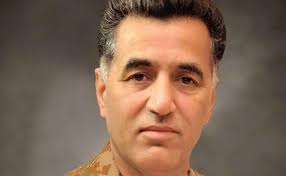ISI Chief


Pakistan’s Former ISI Chief Facing Court Martial: Allegations and Implications
Table of Contents
The news of Pakistan’s former Inter-Services Intelligence (ISI) chief facing a court-martial has sent shockwaves through the nation’s military and political circles. This development is particularly significant given the powerful position held by the ISI within Pakistan’s power structure. The former ISI chief, whose identity has not been officially disclosed by the authorities, stands accused of serious charges that have led to this rare and highly sensitive trial. This article delves into the allegations, the implications for Pakistan’s military, and the broader consequences for the country’s political landscape.
The Role of the ISI in Pakistan
The ISI is one of the most powerful intelligence agencies in the world, often described as the “state within a state” in Pakistan. It has been involved in shaping the country’s domestic and foreign policies, often operating with a significant degree of autonomy. The ISI’s influence extends across various spheres, from counter-terrorism operations to managing Pakistan’s relationships with key international players, particularly the United States, India, and Afghanistan.
The position of the ISI chief is therefore one of immense power and responsibility. The appointment to this role is typically made by the Prime Minister of Pakistan, but it is done in close consultation with the Army Chief, reflecting the close ties between the military and the intelligence community in Pakistan. The court-martial of a former ISI chief is almost unprecedented and indicates the gravity of the allegations against him.
Allegations Against the Former ISI Chief
While the exact nature of the charges has not been fully disclosed, the former ISI chief is reportedly facing allegations related to misconduct, breach of protocol, and possible involvement in activities that could be deemed as undermining the state. Sources suggest that the charges may include the unauthorized disclosure of sensitive information, mismanagement of funds, or even involvement in political manipulation. These allegations, if proven true, would constitute a serious breach of the oath taken by military officers and could have far-reaching implications for national security.
One of the most significant accusations is that the former ISI chief may have been involved in activities that went beyond the scope of his official duties, possibly engaging in political engineering or forming covert alliances that were not sanctioned by the military high command. Such actions would not only be considered a breach of trust but could also be seen as undermining the authority of the civilian government, a charge that carries severe consequences in Pakistan’s political context.
The Court Martial Process
The court-martial process in Pakistan is a military trial conducted by a tribunal of senior officers, and it is governed by the Pakistan Army Act. The process is highly secretive, with proceedings typically held behind closed doors to protect national security interests. The accused officer is allowed to present a defense, and the trial can involve the examination of witnesses, cross-examination, and the presentation of evidence.
Given the high-profile nature of this case, the proceedings are expected to be closely monitored, although the details are likely to remain classified. If convicted, the former ISI chief could face severe penalties, including dismissal from service, forfeiture of pension and benefits, and even imprisonment. The outcome of the court-martial will not only determine the fate of the accused but also send a message to other members of the military and intelligence community about the consequences of overstepping their bounds.
Implications for the Military and Political Landscape
The court-martial of a former ISI chief is a rare event that underscores the internal dynamics and power struggles within Pakistan’s military establishment. The ISI, while being a crucial arm of the military, operates under the supervision of the Army Chief, and any deviation from this chain of command can lead to serious repercussions. This trial could be indicative of a broader effort by the military leadership to reassert control and discipline within its ranks, particularly in the face of increasing scrutiny from both domestic and international observers.
For Pakistan’s political landscape, this development could have significant implications. The ISI has often been accused of meddling in politics, with allegations of influencing elections, supporting certain political factions, and suppressing dissent. If the allegations against the former ISI chief involve political manipulation, it could lead to a re-evaluation of the agency’s role in Pakistan’s governance. This, in turn, could affect the relationship between the military and the civilian government, which has historically been fraught with tension.
The timing of this court-martial is also noteworthy. Pakistan is currently facing multiple challenges, including economic instability, political unrest, and ongoing security threats. The military, traditionally seen as the stabilizing force in the country, may be seeking to strengthen its internal cohesion and credibility in the face of these challenges. By holding one of its own accountable, the military leadership might be attempting to signal its commitment to transparency and discipline, both to the public and to the international community.
Reactions and Public Perception
The news of the court-martial has been met with mixed reactions in Pakistan. Some view it as a necessary step to maintain the integrity of the military and to ensure that no individual, regardless of their rank or position, is above the law. Others, however, see it as a potential power struggle within the military, possibly driven by factionalism or competing interests.
Public perception of the ISI is also likely to be affected by this development. While the agency is respected for its role in national security, it is also viewed with suspicion by those who believe it wields too much power, particularly in the political arena. The court-martial could either reinforce the ISI’s image as a disciplined and professional organization or exacerbate concerns about its influence and accountability.









